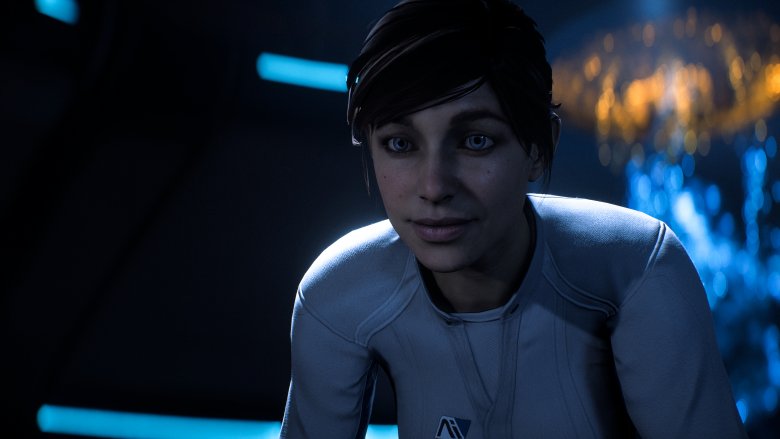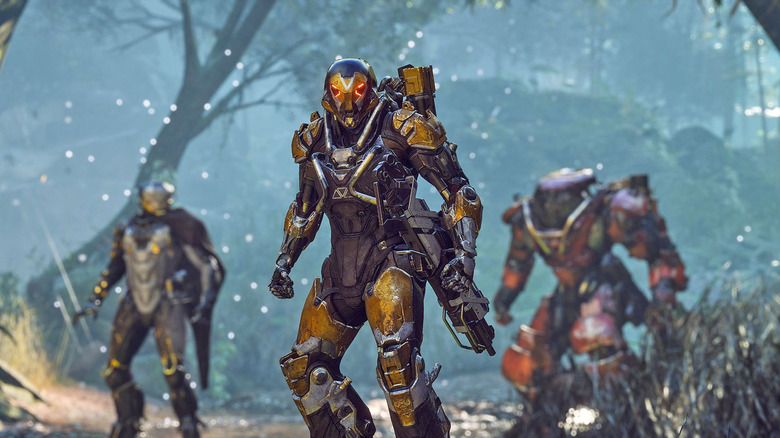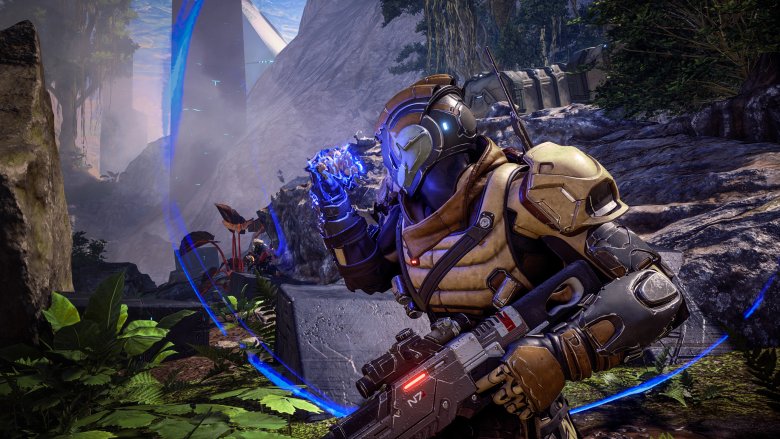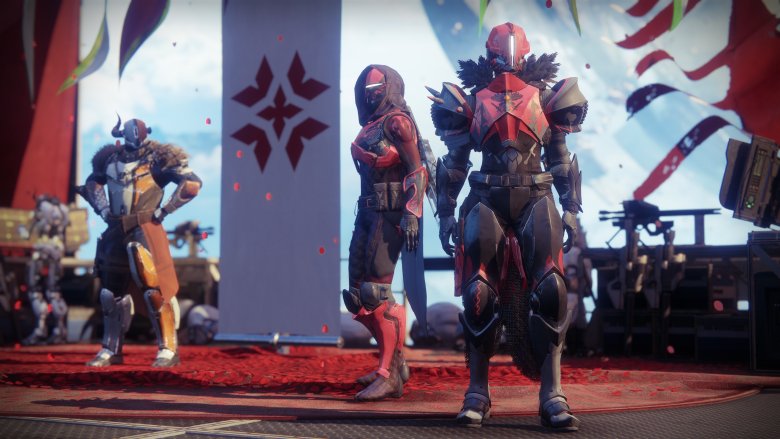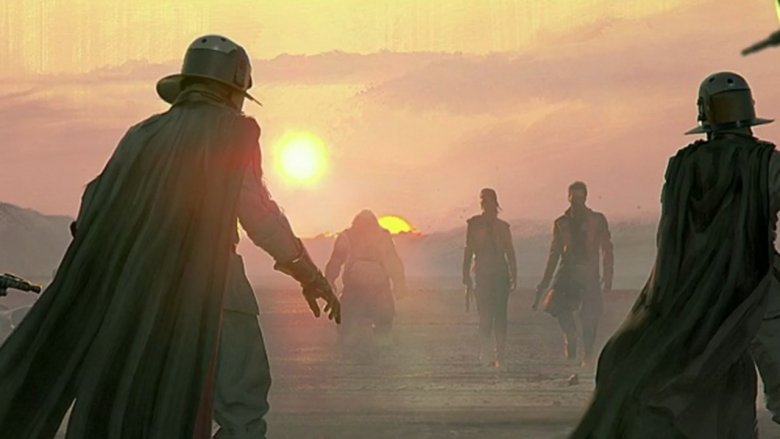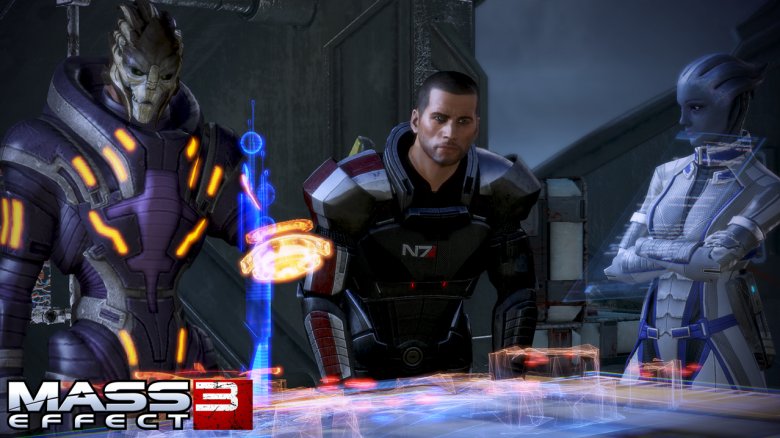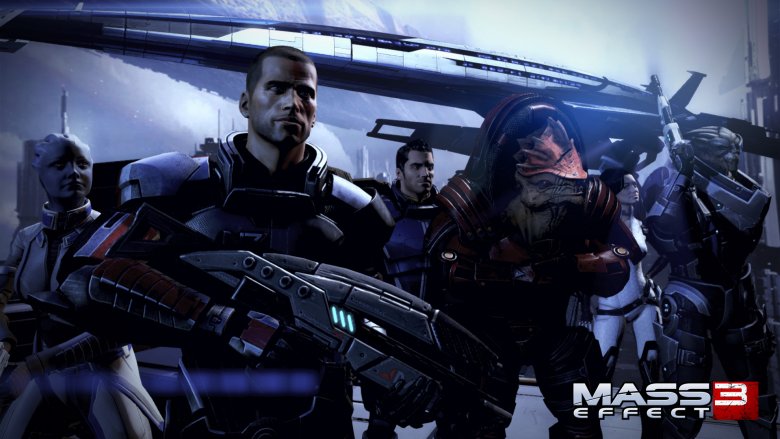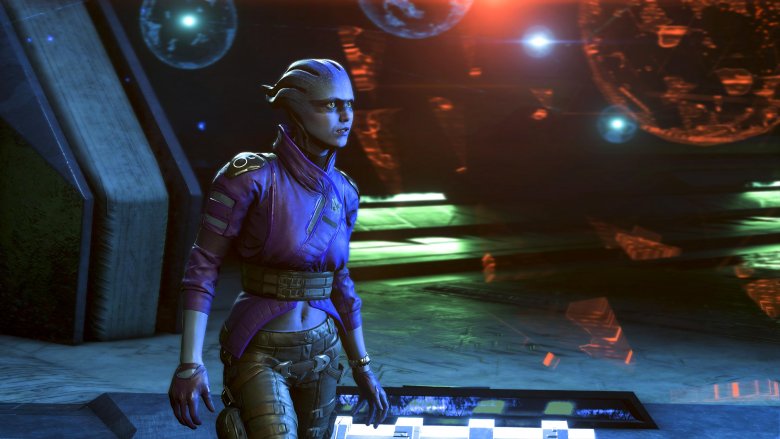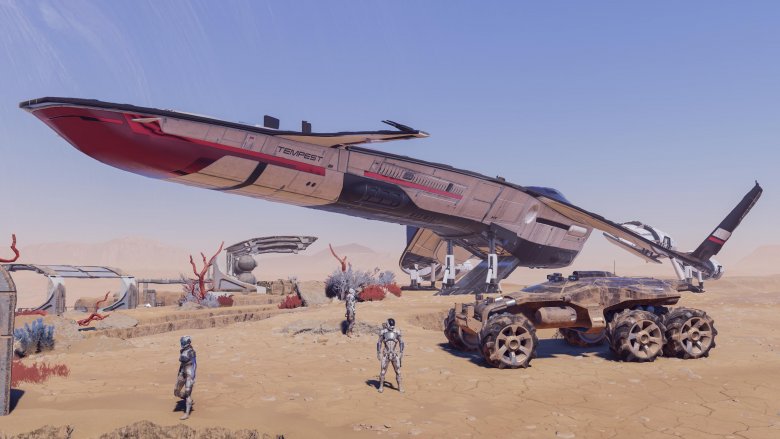Why EA Won't Release Another Mass Effect Game
BioWare is one of the gaming industry's most renowned studios, first striking gold in the Dungeons & Dragons-based Baldur's Gate series, and later continuing on to hits like Star Wars: Knights of the Old Republic and Dragon Age. The developer has always put a strong emphasis on writing, in terms of both story and especially characters. Few games can elicit a genuine emotional connection the way a BioWare game can, whether its losing a dear (fictional) friend or consummating a long-simmering (also fictional) romance. And all of it was due to your actions — or at least, the games do a good job of making you think so.
Of all BioWare's franchises, none had quite the impact on critics, fans, and the industry that Mass Effect has. A sweeping space opera filled with action, political intrigue, and very slow elevators, Mass Effect reset the bar for epic storytelling in gaming and garnered some of the highest review scores in history. BioWare and their parent company Electronic Arts are bound to do another entry in the franchise at some point.
But not for a while. There are a number of reasons why EA would want to shelve this beloved franchise for at least a few years, and frankly, a lot of them make good sense. Here's why EA won't release another Mass Effect game — yet.
The elephant in the galaxy
First and foremost: the latest game in the series, Mass Effect: Andromeda, did not reach the heights of its predecessors. In fact, it ended up as one of the worst-reviewed games in BioWare's storied history. The title had a long and tortured development process, resulting in a final product that was scattered and unfocused. The plotlines and character arcs were simply not of the same caliber as games of yore, and the less said about the facial animations, the better.
For fans of the franchise, Andromeda felt like a stumble at best. While the game has its defenders, at the end of the day, Andromeda hurt Mass Effect's good name far more than it helped it. Sales were so weak that BioWare was forced to cancel planned story DLC for the game, which the studio itself admitted was "frustrating." It should come as no surprise that BioWare officially put the series on ice.
After such a public misfire, EA and BioWare want to take their time, learn whatever lessons need to be learned, and push forward with a better foundation. That means a new Mass Effect is going to be years away at a bare minimum.
Anthem has swallowed BioWare whole (almost)
BioWare is ramping up hard on a new project: Anthem, a shared-world shooter in which players will head out into an untamed wilderness to fight monsters, gain loot, and participate in story missions, very much like Bungie's Destiny. The trailer looks beautiful and the combat appears fast and chaotic: this may well be the most gameplay-centric BioWare game to date. It'll certainly be the biggest, if it's going to live up to the persistent open-world genre.
In other words, BioWare, never the biggest studio in the world, has its work cut out for it. Accordingly, the studio has doubled-down on the game's development, very probably to the detriment of other projects. Certainly, the success of similar games from other studios, like Destiny and Warframe, show that there's a lot of money to be made in this style if it's done right. If they can manage to do so, while injecting their trademark narrative sensibilities into the mix, Anthem could be a juggernaut hit. EA certainly wants it to be, and for sure they want a counter to their rival Activision's success with Destiny.
All of that is to say that finding spare resources for a new Mass Effect game isn't going to happen for a while. Even once Anthem ships, it's intended to be a live-service game, which will continue to eat resources into the future. If BioWare can only make one futuristic sci-fi action game, it's going to be Anthem, not Mass Effect.
BioWare is smaller than it used to be
Not so long ago, BioWare had three studios to its name: the original branch in Edmonton, another in Montreal, and a third in Austin, Texas. However, the production disaster that was Mass Effect: Andromeda was so bad that the entire Montreal studio became a casualty. That team was folded into EA Motive, a studio currently focused on EA's portfolio of Star Wars projects. The result is that BioWare has lost a lot of development resources at a time when projects like Anthem constantly demand more.
Down to just the Edmonton and Austin branches, BioWare must focus on the games already in development: Anthem, the MMO Star Wars: The Old Republic, and a fourth Dragon Age game. That's already a lot to handle just with two teams. Given that both Anthem and The Old Republic require ongoing development even after launch, and that the new Dragon Age apparently contains live elements as well, there's not a lot left over for any other project for the foreseeable future. BioWare would have to spin up a whole new team to work on Mass Effect. And unfortunately, the studio has been doing the opposite lately.
We live in the games-as-a-service era
Nearly all of the biggest games on the planet right now are ongoing projects that receive continued updates long after the ship date: Fortnite, PlayerUnknown's Battlegrounds, Overwatch, League of Legends, Grand Theft Auto: Online...the list goes on. Any game that merely provides a few hours of entertainment has a steep hill to climb these days. While it can certainly be done, those kinds of games need to stand out as the very best of the entire industry. Otherwise, all the money these days is in loot boxes and live-service games.
The Mass Effect series was a pillar of the old model, when people merely purchased games once and then maybe got some DLC. You'd play through the game, then maybe play through a second time to see what you could change in the story, check out the DLC, and then put the game down more or less for good. To come back to life with a AAA budget, EA would likely mandate that some sort of microtransactions be introduced. Figuring that out would take time and resources that BioWare simply doesn't have right now.
That said, Dragon Age is apparently going through that exact process, and might effectively act as R&D for a future Mass Effect game. Time will tell.
EA cancelled the Amy Hennig Star Wars game
The original Mass Effect trilogy were primarily linear, single-player affairs. Sure, you had the ability to choose the order of missions through the Galaxy Map; and yes, hub areas like the Normandy and the Citadel were relatively open. But the core of the experience was running through tightly-authored levels from a set beginning to a set end.
That's exactly the kind of experience EA seems to be steering away from. In a shocking move, EA not only cancelled Uncharted creator Amy Hennig's Star Wars game, but shut down veteran linear developer Visceral altogether in late-2017. That's a lot of firepower taken down in one fell swoop: a great creator, the biggest IP in entertainment, and a top-tier studio. All gone, as Kotaku reports, due to high development costs, a difficult creative environment, and of course, the financial risk of making a game without microtransactions.
Mass Effect is a great IP, but it's not as big as Star Wars. So if Amy Hennig's project could find its way to the chopping block, so could Mass Effect. EA knows that, and would probably prefer not to even go down that road until the evolving financials of linear games settle a bit.
The original team has moved on to other things
Mass Effect was the brainchild of Casey Hudson, who had been the director on BioWare's seminal Star Wars: Knights of the Old Republic before that. His grand vision for a sweeping science-fiction epic with deeply-drawn characters was brought to life by writer Drew Karpyshyn. And of course, BioWare itself was led by its founders, Ray Muzyka and Greg Zeschuk, who turned a miniscule studio in a small city in Canada into one of the most famous brands in gaming.
But the latter three are all gone now. Ray Muzyka left BioWare, and the industry as a whole, in 2012, looking to pursue entirely different interests. Greg Zeschuk decided that he needed more beer in his life, and has become involved in the craft brewery scene. And Drew Karpyshyn, having already left BioWare in 2012 and then returned in 2015, has now put the studio behind him once again. When Mass Effect moved on without them, we got the misfire that was Andromeda. EA may well choose not to move on the franchise again until another top-notch team is in place.
All that said, the original creator himself, Casey Hudson, is now running all of BioWare. That's a pretty important team member in a pretty important role. Although even then, as studio general manager, he wouldn't actually be making games himself the way he made the original Mass Effect trilogy.
It's been a long time since the glory days
Mass Effect 2 remains one of the highest-rated games of all time, and a beloved classic of the entire medium. Mass Effect 3 also reviewed well and is considered a great game — except, you know, for that little business with the ending – you know, the one that caused no shortage of controversy among the game's most devoted fans. This was when the franchise was at its peak, a pillar not just of the gaming community but the broader science-fiction community as a whole.
But the third game released in 2012, and the strength of the IP has only waned since. Andromeda released in 2017 to weak (if not terrible) reviews, and other than becoming infamous for its poor facial animations, did not leave much of an impact otherwise. For the most part, Mass Effect has gone entirely dormant. It's just not a part of the conversation anymore.
EA is aware of this, and if they weren't, Andromeda drove the point home. They know now that if they try another Mass Effect game, they'll be striking when the iron has already cooled. While that doesn't make a new game impossible, it is a serious barrier to entry. EA will have to be absolutely sure that a Mass Effect game can succeed again before greenlighting any sequel.
The games never sold as well as you might think
The Mass Effect games are frequently referenced throughout the industry for any number of factors: strong character writing, dialogue trees, romantic entanglements, and even just space opera in general. Commander Shepard remains one of the medium's most iconic heroes. If you've ever ended a conversation with, "I should go," then the franchise has influence you, too.
And yet, between its glowing reputation, stellar reviews, and the massive shadow it casts across the industry, the games were simply never major sales generators. While official numbers have never been released, estimates put Mass Effect 3 at about 6 million lifetime sales, which is quite simply not a huge number compared with the rest of the industry. Mass Effect 2 before it, and Mass Effect: Andromeda after, almost certainly sold fewer. In an age of ever-increasing development costs, those kinds of numbers just don't add up.
Electronic Arts is a business. They make business decisions based on spreadsheets, not feelings. At the end of the day, they will greenlight a new project based on earnings potential, not nostalgia. Even at the series' peak, Mass Effect was never a major seller. The landscape is even more cutthroat and expensive today than it was in 2012. More than any other single factor, this probably gives EA pause.
But Casey Hudson still loves it
We mentioned before that Casey Hudson is now the general manager of all BioWare. That does mean that he won't personally be making games anymore, the way he made the original Mass Effect trilogy. It also means, however, that he has a lot of influence over the direction of the studio, on what games get made, and on how much love a project will receive.
And he loves Mass Effect very much. It's his baby, after all.
In a tweet, Hudson promised the world that his passion for the series hadn't gone anywhere, and that he would "work on it again in the future." For all the reasons listed here, EA may be hesitant to go through a mass effect relay again. But Hudson has a lot of pull, and if anyone can get another Mass Effect project off the ground, he can. And clearly, he wants to.
Even so, Hudson currently has Anthem, Star Wars: The Old Republic, and Dragon Age IV to juggle. Even with his support, another Mass Effect game is going to have to wait. And by that time, who knows what the gaming landscape will look like, financially, creatively, and technologically? But then again, maybe, like the Reapers, this series is always fated to come back. Franchises can return fresh and remade, different from the old days and yet preserving everything that made them great. Hudson seems to think it's possible.
He thought his crazy idea of a Mass Effect franchise could work back in the beginning, too.
He was right once. He could be again.

